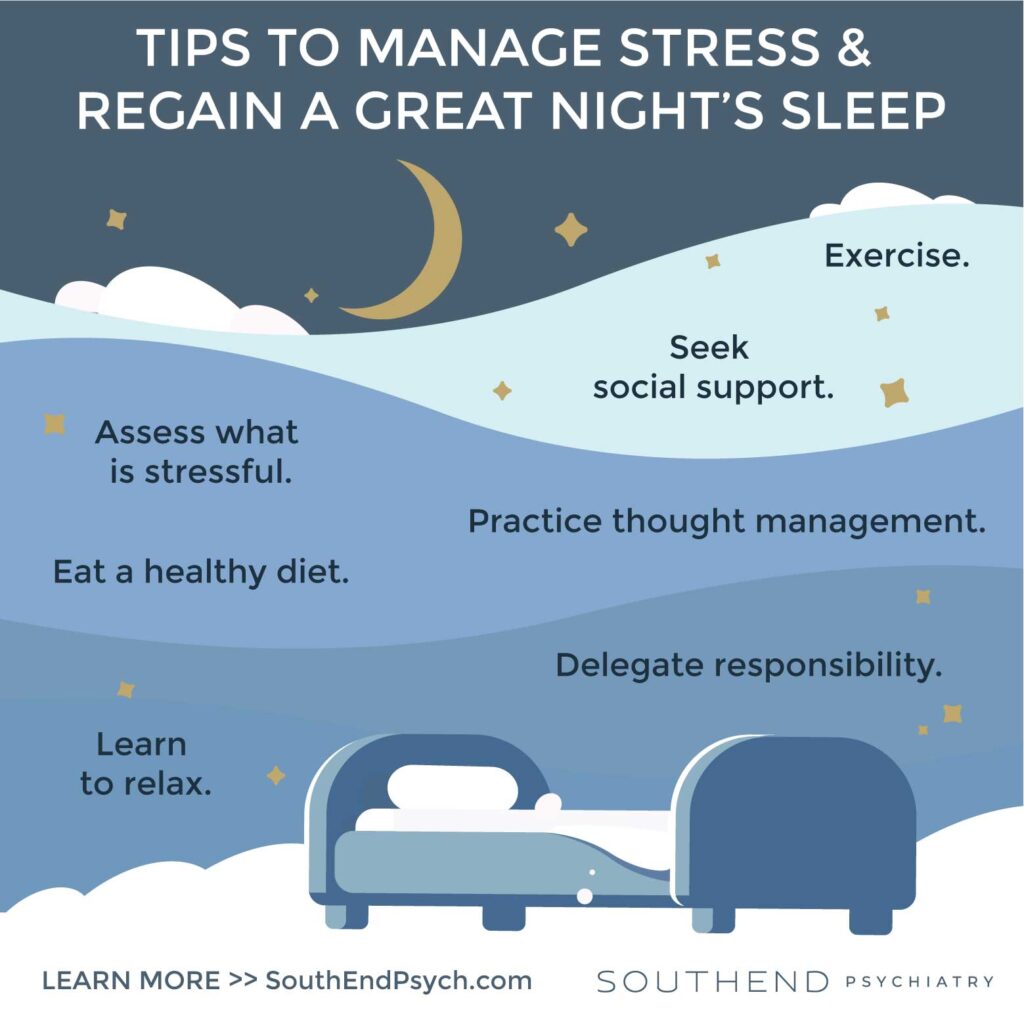Stress has an uncanny ability to disrupt our sleep when we need it the most. As your mind races and tension builds, falling asleep can feel nearly impossible. At Southend Psychiatry, we understand how crucial a good night’s sleep is for mental and emotional well-being. To help you combat those restless nights, we’ve put together five proven strategies to help you relax and drift off, even when stress is trying to keep you awake.
1. Practice Deep Breathing or Meditation
When stress keeps your mind in overdrive, practicing deep breathing or meditation can calm both your body and mind. Try the 4-7-8 breathing technique:
- Inhale through your nose for 4 seconds.
- Hold your breath for 7 seconds.
- Exhale through your mouth for 8 seconds. Repeating this cycle a few times signals your nervous system to relax, easing you into a more restful state.
2. Create a Relaxing Bedtime Routine
A consistent bedtime routine signals your body that it’s time to wind down. An hour before bed, switch off screens and engage in calming activities such as reading, journaling, or taking a warm bath. Incorporating aromatherapy, such as lavender or chamomile essential oils, can further enhance the relaxation process. Over time, your brain will associate this routine with sleep, making it easier to unwind after a stressful day.
3. Limit Caffeine and Heavy Meals in the Evening
Caffeine, sugar, and large meals can interfere with your body’s ability to wind down. Avoid these stimulants at least 4-6 hours before bedtime. Instead, opt for sleep-friendly snacks like a handful of almonds or a small glass of warm milk. This will not only help regulate your blood sugar but also promote the production of melatonin, the hormone responsible for sleep.
4. Use Progressive Muscle Relaxation (PMR)
Progressive muscle relaxation (PMR) is a simple technique that involves tensing and then slowly relaxing each muscle group in your body. Start from your toes and work your way up to your head. As you release the tension in each area, you’ll find yourself feeling calmer and more connected to your body, which can make it easier to fall asleep despite feeling stressed.
5. Journal Your Worries Away
If your mind is racing with worries, try journaling before bed. Write down everything that’s stressing you out, along with any to-do lists or tasks for the next day. This process helps clear your mind and allows you to put those thoughts aside until the morning. You can also end your journaling session by writing down three things you’re grateful for. Focusing on gratitude shifts your mindset away from stress and toward positivity, helping you fall asleep with a calmer mind.
Sleep Is Within Reach
Falling asleep when you’re stressed may feel difficult, but with the right strategies, it’s possible to reclaim your rest. By practicing relaxation techniques, establishing a bedtime routine, and making mindful choices about your evening habits, you can overcome stress-induced sleeplessness.
If stress and sleeplessness are persistent issues, you’re not alone. At Southend Psychiatry, we offer tailored solutions to help you manage stress and improve your sleep. Reach out to us for professional guidance on achieving a balanced and restful life.
Southend Psychiatry
Schedule your appointment today with one of our SouthEnd Psychiatry clinicians. Book your appointment online or call 1-800-632-7969 to get started today.





